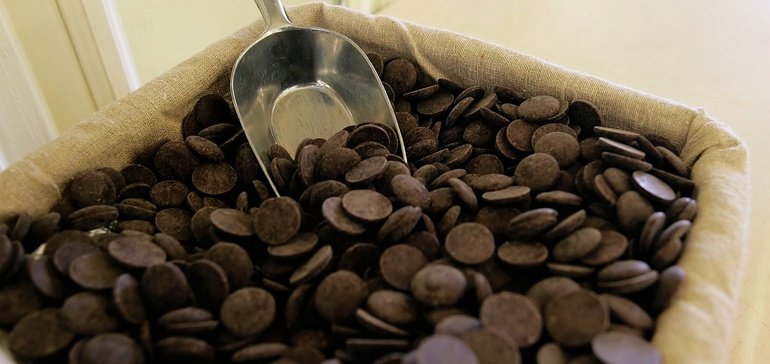Barry Callebaut’s better-for-you portfolio to use 100% sustainably sourced cocoa and vanilla

Dive Brief:
- Chocolatier Barry Callebaut is transitioning its North American portfolio of better-for-you offerings to sustainably sourced cocoa and vanilla. This includes sugar reduction solutions and its high-protein, dairy-free and organic offerings.
- Barry Callebaut’s cocoa will be Cocoa Horizons verified through the Cocoa Horizons Foundation, which was established by the chocolate ingredients producer. These products will then include a premium that the foundation uses to support cocoa farmers and their communities. Barry Callebaut is also partnering with vanilla supplier Prova to support sustainable vanilla production.
- Despite sustainability initiaves from many companies, a 2018 Cocoa Barometer report concluded that cocoa and chocolate companies’ efforts have had little impact during the past 10 years. Nonprofit Green America, however, issued a scorecard this year on some of the top chocolate companies, showing some like Hershey and Mondelēz making strides.
Dive Insight:
Attention around human rights and environmental health in the cocoa industry has been mounting as stakeholders put increasing pressure on major players like Barry Callebaut to take action in their supply chains. The Cocoa Barometer report concluded that 2.1 million children work in cocoa fields in Côte d’Ivoire and Ghana alone and that the average cocoa farmer earns about one-third of what is considered a living income. It also determined that 90% of West Africa’s original forest has been destroyed.
Similar issues are occurring in the vanilla bean supply chain, including pricing and product quality concerns. Child labor is also used to harvest and process vanilla — particularly in Madagascar, where 80% of the world’s global vanilla supply is currently produced.
Adding more pressure, global demand for chocolate has skyrocketed where the cocoa and chocolate market is projected to surpass $67 billion by 2025, according to a 2020 report from Fortune Business Insights.
Chocolate makers across the board have been attempting to clean up their supply chains. As public awareness around human rights issues and environmental health increases, many industry analysts have stated that commitments around transparency and sustainability are no longer an optional endeavor for cocoa-dependent companies.
Barry Callebaut frames its ongoing sustainability efforts in its Forever Chocolate initiatives. The four initiatives aim to eradicate child labor from its supply chain; lift half a million cocoa farmers out of poverty; become carbon and forest positive; and provide 100% sustainable ingredients by 2025.
In its 2019-2020 sustainability report, Barry Callebaut said 61% of its non-cocoa ingredients are sustainably sourced and it had reduced its supply chain’s carbon footprint by 8.1%.
Other chocolate companies are also making sustainability-minded moves. In 2018, Hershey announced a $500 million investment in cocoa sustainability strategies in Ghana and the Ivory Coast, while Olam announced it achieved 100% traceability last year for the cocoa it sources thanks to new technology. Nestlé, Lindt, Mondelēz and Cargill have also made cocoa sustainability pledges.
Mars, which has committed to a 100% sustainable supply chain, has partnered with agricultural analytics company Nature Source Improved Plants to expedite the development of new cacao varieties with greater yields, better disease resistance and higher quality. It also created a fund in partnership with Dannon to reduce poverty among Madagascan vanilla farmers while also improving vanilla quality.
As more major players in the cocoa industry make good on their promises to provide greater transparency and improve sustainability, adopting similar practices will likely become an industry standard. To the extent that chocolate companies are able to tout these efforts in their brand messaging and packages, they may be able to attract the growing number of consumers who show preferences for brands with strong environmental and social justice platforms.
Source: fooddive.com

